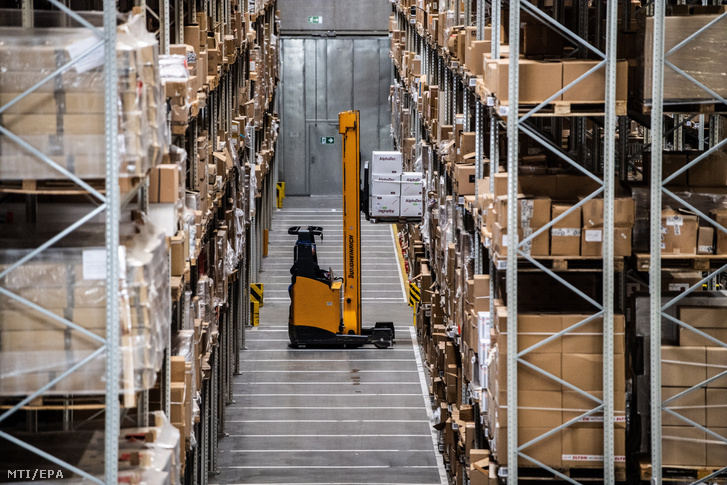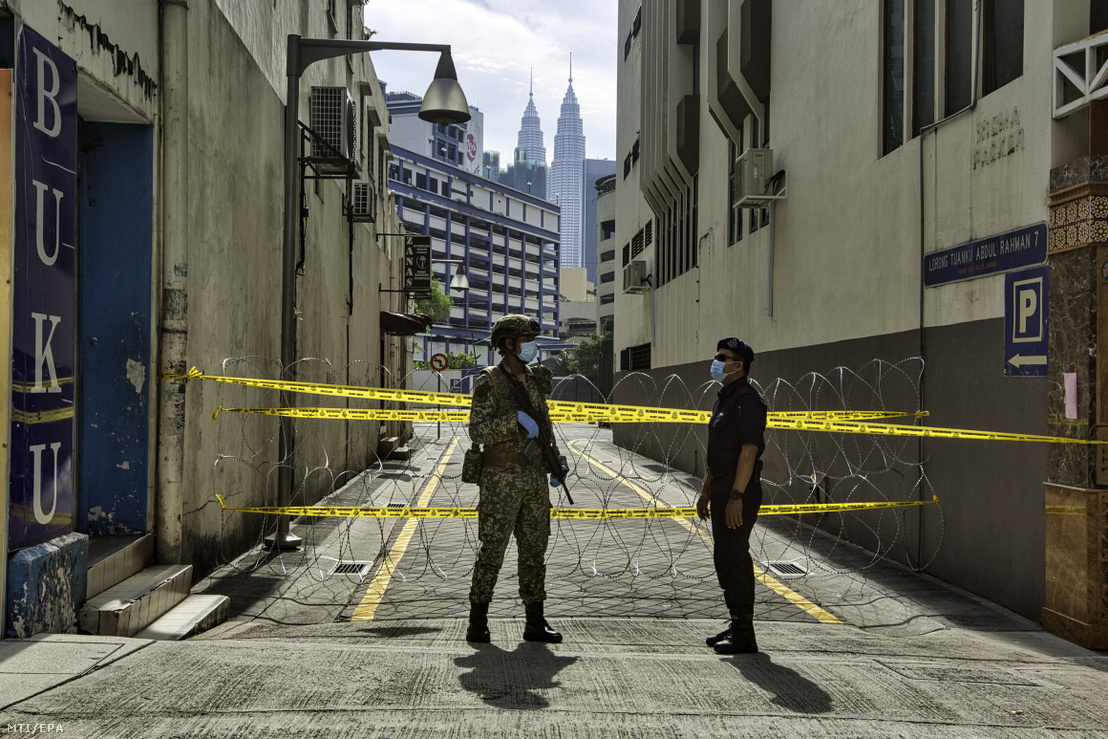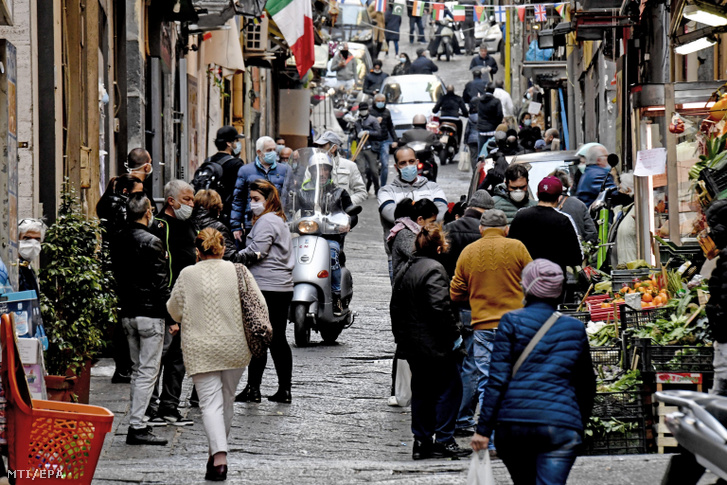The world will never be the same again after the pandemic

The way humans live their lives could completely change due to the effects of the coronavirus pandemic. Will we ever fly to distant continents again, knowing this is how the global spread of the epidemic started? Will we follow the same economic principles and rely on China when it comes to manufacturing, and neglect national competences? Evolutionary biologist Eörs Szathmáry thinks we can turn the situation to our advantage, we must look at the pandemic as part of a learning process.
This story is a part of Index's partnership with Covering Climate Now, a global journalism initiative currently putting on a week of coverage focused on climate solutions to mark the 50th anniversary of Earth Day.
There are more things in common between the coronavirus pandemic and climate change than you might first think. None of them are linear systems in the sense that the changes they induce do not happen evenly, which is why, for a while, it seems as if nothing is happening - but after reaching the tipping point, there is no return, and irreversible processes begin.
The dynamic of an epidemic is a different example of such non-linear phenomena, but it has the same staggering effect when we first have to face it, evolutionary biologist, academic, and director of the Hungarian Centre for Ecological Research Eörs Szathmáry opined in his interview with Index. After the tipping point, he added, the system enters into a stage that is already unbearable for us.
A vulnerable world
The current situation clearly shows how vulnerable our civilization really is, but experts were not surprised by this at all. The evolutionary biologist thinks, however, that the pandemic could lead to positive outcomes as well: everyone can finally see and understand that the world we know is not, in fact, indestructible.
Maybe coronavirus is the price we pay for this knowledge,
- the researcher argued. The exact reason why the world will never return to where it was before the pandemic is that this ill-founded confidence will no longer exist. Most people, including decisionmakers, will live in a much more careful way, and they are right to do so, as we can not even hope that such crises will not regularly happen in the future.
Climate change in itself is bound to cause a myriad of problems. Many coastlines could become uninhabitable, agricultural lands will go barren in certain places, others will have to face draughts or floods. But as an effect of climate change,
we can expect new contagious diseases to cause serious headache.
Amongst these, we will see completely new pathogens (such as the SARS-Cov-2 responsible for the current pandemic) and known pathogens that will spread to new areas as accommodating hotter climate develops in formerly colder regions. Other diseases, such as Malaria, which may have been present in Europe earlier but were thought to have been eradicated due to advances in medical sciences could once again return to the developed world as the ecological circumstances there transform.
"Not all new pathogens will prompt such a global crisis as the coronavirus now (although we cannot rule that out either). But it is obvious that the appearance of contagious diseases will become more regular. Let's imagine a situation where there are three or four diseases spreading through the population. Maybe on their own, these epidemics would not cause any major problems, but if their effects add up, we could see a storm of pathogens the effect of which could far exceed the damage caused by the coronavirus pandemic."
It is possible to calculate what degree of workforce-shortage a society can withstand. If there are several diseases spreading at the same time, more and more people will be falling ill and becoming unable to work.
If this ratio passes a certain threshold, the economy of a state or a region will collapse, taking its civilization down with it.
Factors threatening civilization could combine and amplify each other. Thus the problems of the pandemic and climate change cannot be separated from one another, and from the corresponding socio-political issues either.

Local competences
Due to the way the global economy operates, a disaster happening anywhere can immediately spread shockwaves across the globe, triggering a number of subsequent problems in distant regions. Now, when we are neck-deep in the initial response to the first wave of the coronavirus epidemic, China may still see an increase in exports as the entire world is trying to buy protective and medical equipment from them that is necessary now for saving lives.
But at the same time, there are already voices blaming the situation on national economies being too dependent on imports. Countries across the world had reduced their manufacturing capacities, as it was more cost-effective to buy the cheaper products of Chinese factories. A crisis like the one we have was necessary in order to see that economies must be more self-reliant to be able to weather the next crisis better.
"We have to establish local competences that are vital in an emergency like a pandemic. To put it simply, we cannot put Hungarian patients in Chinese hospitals. Yes, in a sense, this sort of economy was able to keep production costs low. But from now on, we will have to evaluate costs differently. Right now we are spending fortunes on responding to the pandemic. We cannot say that this does not matter, that this is outside of the economy."
Eörs Szathmáry says that the old medical wisdom of putting prevention first can apply to the entire world as well. In the near future, we will have to allocate more resources towards preventive measures. It may cost a lot of money, and it may cost a lot of money long before it becomes apparent to laymen that spending it is necessary, prevention still costs significantly less than managing an epidemic and counteracting the economic disaster in its wake.
One of the great difficulties in planning defensive measures is that while deciding what steps to take requires a level-headed, rational, goal-oriented approach, solidarity is one of the moral cornerstones of European culture. But solidarity, empathy felt over the pain of others, does not always go hand-in-hand with decisions based on cold cost-benefit calculations.
"In a certain sense, it would be more cost-effective to leave the infected die. But with that, we would be giving up our European identity, which is something I reject. Our culture guards the notion of what we want to have as a sustainable civilization,
and we have to evaluate the advantages and disadvantages of decisions keeping that in mind.
As most researchers say that human behaviour was what ultimately caused climate change, it is possible that a change in this behaviour could also affect climate trends - positively or negatively. The short-term effects seem to be positive so far, as the reduced traffic means lower pollution in many cities, which also reduces the severity of COVID-19's complications.
Smokers and people exposed to pollution are at a higher risk if they become infected. The quarantine measures are extremely taxing for many people, and it cannot go on forever, but at the same time, Szathmáry says they teach society that there are other ways to live.

Small communities
Given the current level of technological advance, the possible applications of remote work are far wider-ranging than what corporations ever thought before. Businesses will come to realize that there is no need for huge office blocks and that it is unnecessary to waste employees' time by forcing them to commute there and back each and every day. Even if employees occasionally have to be personally present at the office, most office tasks today can be completed remotely without any issues.
Of course, humans need the company of others. But we also found out that digital technology is at least partially capable of fulfilling this need for essential social contact. Groups of friends meeting virtually in split-screen video calls show how we find ways to meet our social needs even in extraordinary times like these. He adds:
When the quarantine is over, people are likely to take a better look around in their small communities. They might realize that it is indeed possible to have a conversation with your neighbors, and you don't have to go downtown to eat at a restaurant, there is food at the pub down the street as well."
"People do crave social interaction, but we may see archaic forms of it return. Habits that were lost due to our hurried, travel-intensive lifestyle. I already see the signs of this, despite the quarantine being far from over."
The pandemic will most likely hit economic sectors the hardest which are based on long-distance travel. Borders may reopen, flights may restart, it is still a question if tourism and travel will ever fully recover to its state just a couple of months ago.
In many respects, it would be a welcome change if people traveled long distances less often, as air traffic is amongst the chief drivers of climate change. This crisis could be turned to our advantage in general if we could relaunch the economy in a way that breaks with old principles and use this opportunity to introduce green solutions. But there will be negative short-term effects as well. There are many tourist destinations across the globe, especially in developing countries, for which declining tourism from the West would be the equivalent of a death sentence.
Eörs Szathmáry admits that countries relying heavily on tourism will suffer in the upcoming period, but he thinks its possible that along with the decline of long-distance travel, regional tourism could increase. It is cheaper for a tourist to fly two hours to a destination instead of ten, and the ecological impact of the industry will significantly drop, just like its ability to transmit diseases.

What can we expect?
How will we withstand the unpredictable restrictions and the new waves of a pandemic that could become seasonal until a large enough portion of the population acquires immunity (hopefully through vaccination) against the virus?
"Seasonal epidemics are not unknown to humanity. We manage to live with the flu somehow too, although that is much less dangerous. With time, more and more will become partially immune, and it is a concern that people with especially vulnerable genetic makeup would eventually be selected out of the population."
The mutation and recombination rate of the flu is higher than that of this coronavirus, therefore it evolves faster as well, so we can hope that once we defeat the pandemic, the next wave will not cause problems of this proportion.
"I am much more worried about the new diseases that could constantly surface in the near future and could affect not only people but livestock and crops as well. Once there are too many of them and new epidemics keep coming, we will be in huge trouble."
What can we do about these? The Hungarian edition of Index recently wrote about the DAMA-protocol that was developed for early signalling of newly emerging and potentially dangerous diseases. US researchers had a similar program some time ago (although focusing purely on viruses) called Predict, but the government withdrew financial support from the initiative as it did not seem that important to spend tax money on it at the time - though now everyone regrets binning the Predict. But there is nothing that guarantees that these attitudes would change once the pandemic is over.
Still, Eörs Szathmáry is optimistic in this regard, he believes that humanity will understand that if we want to reduce the dangers or alleviate the effects of future pandemics, we must spend on it now. This is a simple investment with instant returns once an economic crisis like the one now becomes avoidable.
But for this to work, many countries have to be convinced to adopt a proactive approach instead of the reactionary attitudes, individual countries cannot do much alone in this regard. We saw that the current pandemic started in China due to processes completely independent of us - the only way to prevent similar crises is to make these initiatives global over the next few years.
This article is a direct translation of the Hungarian original published on Index.hu.
(Cover: The empty streets of Paris on 2 April 2020. Photo: MTI/AP/Thibault Camus)

Support the independent media!
The English section of Index is financed from donations.


